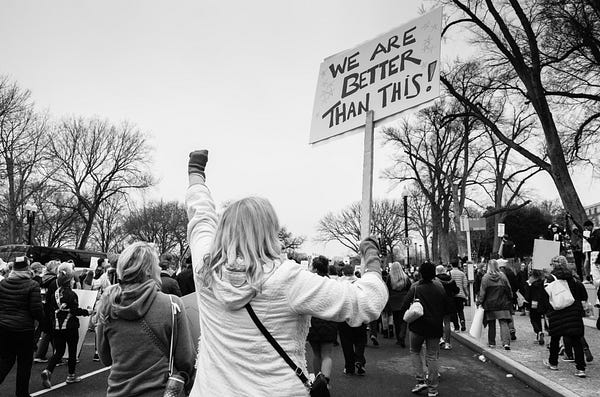
Why have so many memoirs of recovering from addiction been published in the last fifteen years? I’d say it’s because addiction and recovery are significant issues for many contemporary families. In other words, those memoirs are personal stories touching on a big-picture issue. As such, they become more relatable for people who are concerned about those issues.
In the same way, memoirs about people who survive a serious or chronic illness can give hope to people who are experiencing health-related challenges, or whose loved ones are suffering.
People read memoirs to identify and clarify their own stories, as well as for the beauty of language, the pull of story, or the memorable characters. Touching on significant issues in the context of a personal story helps to alleviate any “me, me, me, it’s all about me!” in a memoir, and it also makes the personal more universal. Or, to quote the second-wave feminist movements, it shows us that the personal is political.
Currently, I’ve divided my memoir draft in three sections. The bigger issue in the first section of my memoir is family separation and reunification. In the second section, it’s addiction’s impact on families. I haven’t figured out what it is in the third section, which so far covers the deaths of many family members, DNA testing, what happens when kids who were in foster care have kids of their own, and mass incarceration in the American prison system, among other things.
Maybe that’s a heads up for me that I’m covering too much ground in that third section.
Or maybe if I choose one significant issue, that can become my organizing principle for the third section.
But because I’ve had editors tell me (sometimes) that I sound like a bossypants, I know there’s a danger for me in deliberately exploring a significant issue in a memoir.
The danger in tying your story to a bigger issue is that you might fall into didacticism, better known as being a bossypants.
And no one likes a bossypants. So let’s say I decide the third section of my memoir is connected to the issue of mass incarceration. It’s tempting for me to haul out my old lawyer identity to argue against mass incarceration using evidence like studies showing how expensive it is, or international comparison statistics.
But my memoir is a personal story, not an editorial. Instead of taking the easy way out by arguing the evidence against mass incarceration, I have to rely on the details of the story.
So let’s see — how am I doing? What are your thoughts about the prison I describe in this scene from an essay about visiting my niece BeeBee at a women’s prison in Florida? Am I being a bossypants?
It was no place like home, but it was a place for families. They sat on metal benches in the processing room, waiting for their loved ones, hoping the next face would be the one they’d longed to see. As if to extend the suspense, the guards released inmates one by one through a gate in a chain-link cage. My niece BeeBee strutted out in a yellow t-shirt and chinos, and I stood up to hug her.
Like every woman I’ve ever known who’s done time, BeeBee had put on weight. This is usually a good thing; most women who get sentenced to prison have worked their bodies to the bone for drugs. When our hug ended, she stepped back and bounced on the balls of her feet like an athlete. Her thighs were thick with muscle and her arms were round, but her waist was still trim. When she lived on the outside, she’d made a living selling drugs and dancing in strip clubs; in prison, she made her way by winning dance challenges, and by winning fights.
We walked outside to the visiting area in the prison yard. Concrete tables squatted under a roof for shelter from the rain or the hot sun, but we didn’t need protection that day. The sky was clear, and the air was warming, but I already felt locked in and ready to leave.
Across the yard, on the other side of a barbed-wire fence, a massive concrete block building was going up, a construction project that wasn’t visible from the road. BeeBee told me it would be an addition to this women’s prison, and it looked as if it would be ten times as big as the current facility. The grapefruit I had for breakfast congealed in my gut, rose up, and burned my throat, as if I already knew that once construction was completed on this monster, it would rank as the largest women’s prison in the entire country.
Then she started talking about the times when I used to rent a beach house on Tybee Island, near Savannah, Georgia, and our whole family stayed together for a week. In those years, my nieces and nephews — eleven of them — were all children, running wild on the sand, rampaging through the ice cream parlor, and tearing up the rental house. I’d sometimes get the middle-class heebie-jeebies when they were too loud in a restaurant, or too daredevil on a playground, but mostly I sat back and admired their untamed joy.
How about you? What bigger issues do you grapple with in your memoir, whether it’s written or planned or somewhere inbetween?